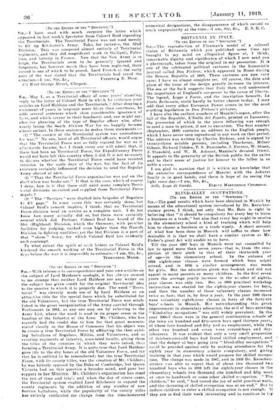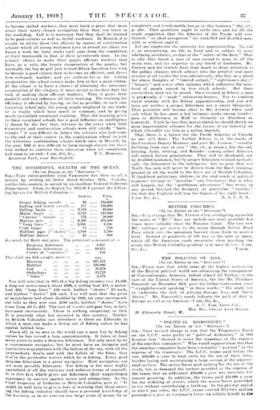BLIND-ALLEY OCCUPATIONS.
(To THE Horton or TRE " SPECTATOR.") SI12,—T110 good results which have been obtained in Munich by means of the educational system introduced by Dr. Kerschen- steiner prove, I think, not only that Mr. Bale is right in believing that "it should be compulsory for every boy to learn a business; or a trade," but also that every boy (night to receive in the elementary school a kind of training which will help Isles to choose a business or a trade wisely.. A short account of what has been done in Munich will suffice to show how desirable it is that we shall have a similar system as Mr. Fisher's great Act will enable its to have. -
Till the year 1907 boys in Munich were not compelled by law to spend more than seven years—that is, from the com- pletion ot their sixth to thnt of their thirteenth year of age—in the elementary school. la the autumn of 1899 eighth-year classes were formed which boys mioht attend, and in 1890 a similar arrangement was mode for girls. But the education given was bookish and did not appeal to many parents or many children. In the fire, seven years the average yearly inermse in the at sober of eighths year classes was only two. But in 1900 practical workshop instruction was started for the eighth-year classes for boys, and then the number of these voluntary clauses increased to-ice on fast; that is, by four a year. In the year 1900 there were voluntary eighth-year classes in forty of the forty-six boys' schools in Munich. But notwithstanding this great improvement iu elementary ethmation, the evil of boys entering "blind-alley occupations was still widely prevalent. In the year /908-7 there were in the genteel continuation schools of the town six hundred and fifty-seven boys aged thirteen years, of whom four hundred and fifty had no employment, while the other leo hundred and seven were errand-boys and day' labourers, It was evident that only a very small proportion of thirteen-year-old boys had found Wiled employment, and that the danger of boys going into " blind-alley occupations" could be guarded against only by molting attendance for the eighth year in elementary- schools compulsory, and giving training in that year which would prepare for skilled occupies tion. The change was made in 1907, and in 1909 Dr. Kersehen- steiner can able to report that of about two thousand two hundred boys who in 1908 left the eighth-year classes in the elementary schools two thousand one hundred and fifty went at once to handwork or some other skilled occupation. " The children," he said, " had tasted the joy of solid practical work, and the shunning of skilled oecupetion was at an end." But to induce children to enter a skilled occupation is not enough. 11 they are to find their work interesting and to continue to try to become skilled workers, they must learn a great deal more about their newly chosen occupation than they con learn in the workshop. And it is necessary that they shall he trained to be good citizens as well as skilful workmen. In Munich it is caught to attain these two objects by means of continnetion schools which all young workmen have to attend for about ten hours a week for forty weeks each year from the completion of their fourteenth to that of their seventeenth year. In the schools' efforts to make their pupils efficient workers they have, as a 'rule, the hearty co-operation of the pupils; but naturally the boy or girl just turned fifteen has often less wish to become a good citizen than to become an efficient, and there- fore well-paid, worker; and yet without his or her willing co-operation the school cannot make him or her a good citizen. If the school is to have a chance of obtaining the necessary co-operation of the scholars, it must accept as.its first duty the task of making them efficient workers. Then it gains their goodwill and can influence all their training. The training for efficiency is effected by having, as far as possible, in each con- tinuation school only the young people employed in ono trade, or in trades whirls have mucli in common, and by giving meets specialized vocational training. That the training given in these vocational schools has a good influence on intelligence is shown by the fact that, whereas itt the years when both elementary and continuation schools were stilt chiefly " book- er:hoots " it was difficult to induce the scholars who had come to the end of their course in the continuation school to join the veluistary continuation schools which exist in Munich, by the year MC it was difficult to form enough classes for those who wished to continua their education when all compulsion had come to on end.—I am,- Sir, Sr., T. C. HORSE ALL. Steariscoe Park, near Macclesfield.



































 Previous page
Previous page